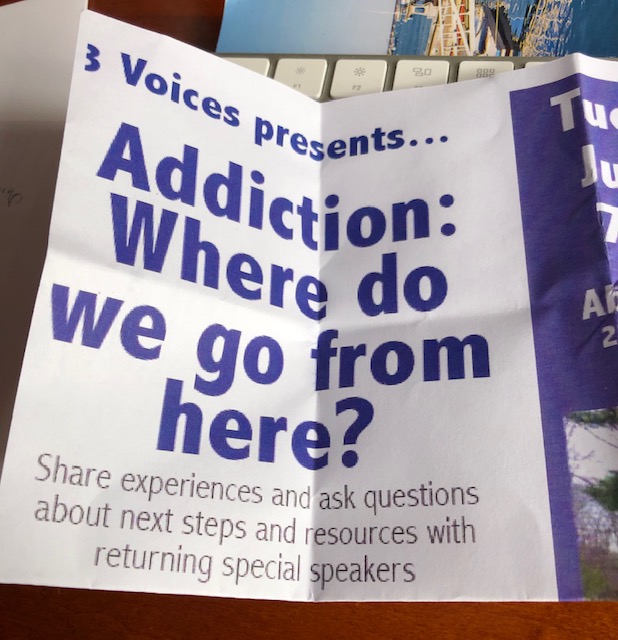Last night a panel of recovering-addicts-turned-caregivers, and parents of children in recovery was asked, “What can we do to prevent addiction?”
It’s likely that a combination of things that prompt recovery may also be used to prevent addiction in the first place – but it’s unlikely that any one of these separately is sufficient to curb addition. Whatever the solution, it will likely have to include changes at a social level to address stigma and provide resources to facilitate changes in individual behavior.
The “antidote” themes raised by the panel included:
- Spirituality
- Self-confidence
- Community
- Education
Spirituality
This may be the most difficult since it’s the least tangible, but it has been critical to my own sustained recovery. Unfortunately, while faith can be demonstrated and discussed, it can’t be taught or otherwise transferred from one of us to another; it has to come from within.
There was discussion about the role that local religious leaders play in the addressing the growing epidemic, but speaking from experience, being asked to subscribe to a belief for which there’s no tangible, scientific explanation doesn’t always work.
As a yogi I suggest that each of us learn to discern between our ever-changing thoughts, and our never-changing awareness of them. The latter is evidence of our immutable consciousness. When it ‘clicks’ that an aspect of ourselves NEVER changes, and isn’t affected by fear or desire, the realization gives rise to faith in the source of consciousness – and we begin to see and live our lives from a spiritually appreciative perspective.
Self-confidence
Faith gives rise to a sense of purpose, confidence, and appreciation. We come to love and respect our neighbors and ourselves; specifically, we take better care of our own temporal body and mind (fostering health, strength and determination) in part to better serve others.
Community
Almost without exception, and certainly in my case, addicts are masking a deep sense of emptiness, loneliness, and/or worthlessness for which there may be no readily apparent explanation. Without exception, each of last night’s recovering panelists spoke of coming from loving homes. Addiction is a disease which some are biologically more susceptible to than others. We all need to feel appreciated, accepted and valued, and a sense of inclusion, belonging and love; these emotions foster serenity and courage.
Education
It’s critical that we all understand the nature, pitfalls (denial), dangers and consequences of addiction, though rather than traditional PSA-type educational programs, last night’s panelists unanimously agreed that the source and voice of the message makes all the difference; kids are more likely to be receptive and to heed the warnings of peers whom they can relate to, rather than school authorities.
Habits (good and bad) occur at the intersection of desire, availability and knowledge. Communally, we need to provide a safe space where those in distress or at risk feel welcome, that facilitates their emotional, mental and physical development, in a manner they want to participate in.
No one proposed specific solutions last night to what’s obviously a HUGE cultural problem [Salem Hospital sees 2-3 overdoses a night, of which 1-2 patients die each week], but we left somewhat more hopeful knowing there are heroes among us, people who devote themselves to fighting this scourge and relieving the suffering of others.
Last night’s panel was moderated by Michelle Simons of Prevention Werks: https://preventionwerks.com/
Prevention Werks is a resource for prevention, addiction and recovery that was created from the awarding of a grant to the City of Lynn, which provides presentations and set up resource tables at events in the community to educate the public about substance use.
The program, sponsored by 3Voices.org, was recorded by MHTV.




